When you decide you’re going to start taking SEO seriously, you’ll most likely have to start with some housekeeping. Hunting for some of the most common SEO mistakes is a great way to get the ball rolling.
I know, I know. Doesn’t sound like fun. But trust me, you’re going to want to take care of all of this first. And don’t worry, by following the advice in this guide you’ll be done in no time.
Afterwards, when your ducks are all in a row, you’ll be able to reap the benefits of a fully-fledged SEO strategy complete with keyword research, link building, and content marketing.
But let’s not get ahead of ourselves just yet. First, work your way through this list.
1. You Didn’t Set-Up Google Analytics
Your SEO efforts will severely suffer if you don’t take the time to set up Google Analytics.
There’s a business adage that you’ll hear bandied about and it usually goes something like this:
“You can’t improve what you can’t measure.” – Some Guy/Gal
Now, you can probably (and accurately) guess that this isn’t really true. It’s too black and white.
But there’s some wisdom to be gained from considering it anyways.
Without the ability to monitor the effects your SEO campaign has on traffic numbers and the behavior of your web visitors, it would be pretty impossible for you to know what’s working in terms of creating an enjoyable user-experience.
GA Checker is probably the easiest way to look for this particular mistake. With just one click you’ll find out if you’ve got the GA code properly installed all throughout your domain.
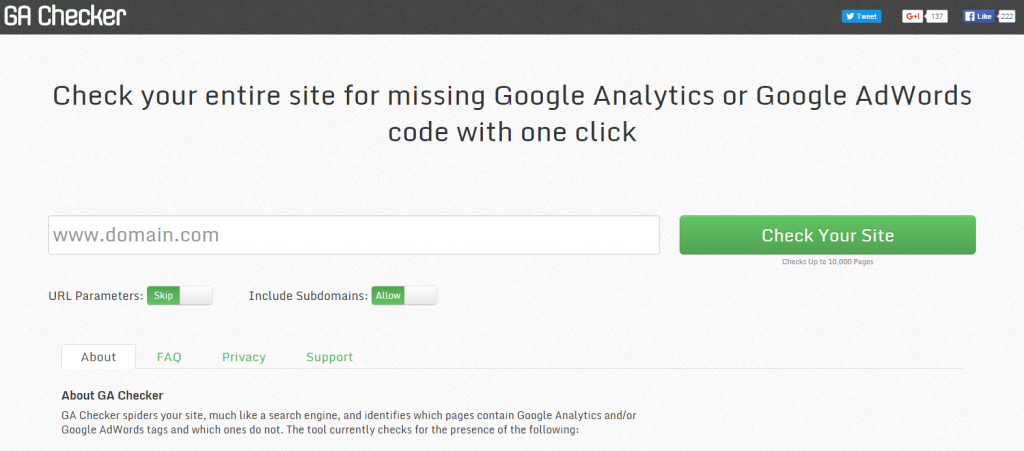
If you find you do indeed have a problem, Google’s got your back. Here’s their own quite user-friendly guide on how to get set up without further issue.
2. Your Content Doesn’t Reflect Your Keyword Strategy
This can happen for a variety of reasons, here are a few of the most common culprits
- You did a site redesign
- New data caused you to change keyword strategy
- You wrote your content before doing keyword research
Regardless of the reason, the end result will be the same: diminished results from your SEO efforts.
You might think it’s so simple that you wouldn’t fall victim to this one, but you’d be surprised how often it happens.
It can be quite difficult to keep track of everything related to managing a website and an SEO campaign. Nobody blames you, I certainly don’t.
So do yourself a favor and make sure that your on-page copywriting aligns with your current keyword strategy.
3. You Don’t Have 100% Original Content on Each Page
This extends beyond the usual warnings about duplicate content.
Surely you know plagiarizing is bad. Surely you know that if you rip off someone’s content, it’s most likely going to come to light at some point and Google will slap you with a penalty.
Not worth it.

But even with that warning aside, mixing up the copy on each page of your site so it’s fresh and original will really help your SEO efforts. Instead of copy/pasting a sales pitch or product description, you’re be better off rewriting it.
This not only gives you a chance to work on your sales-speak, but it also gives Google reason to believe your site is original and relevant. Share on XIf you find yourself lacking inspiration, we’ve got a great article full of copywriting tips from a handful of industry experts.
Lastly, when in doubt, you can use a tool like duplicate content checker to see if there’s any copied content on a webpage. It’s free and easy to use.
4. You Have Broken Links on your Site
You might think that a few broken links here and there won’t matter.
You may be right. Then again you may be wrong.
Debate still rages about whether google will actually hand out penalties based off 404 errors, but there’s no doubt that broken links hurt the user-experience your website provides.
There are some creative and amusing ways to use 404 errors to delight your visitors in the event that they do stumble upon a broken link, but it’s still best to avoid leaving them hanging around altogether.
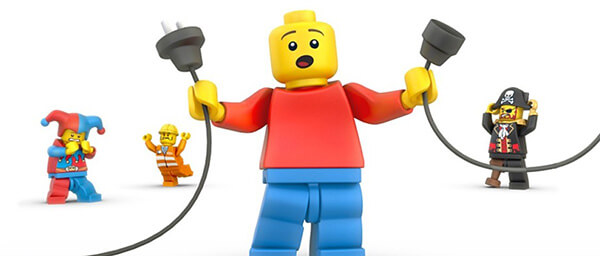
Image Credit: Lego
So while you might not get a penalty, it’s so easy to find and fix broken links that it’s really not worth the risk or annoyance to your visitors.
You can use broken link check to find broken links in under a minute, and then all you have to do is replace them with working ones.
Unless you have a truly massive site, you should be able to take care of this with just a few minutes of work a week.
5. You Aren’t Using Unique Title Tags
This is similar to being guilty of having duplicate content on your site.
Title tags are a way for you to give each page a unique flavor, and search engines will love you for it. Share on XYou want to make sure that you have solid keyword density throughout your title tags, while not sounding repetitive or non-sensical.
You’ve probably had it drilled into your brain to no end at this point, but your SEO efforts will generally center around being unique, relevant and human-friendly. The days of keyword stuffing are long gone.
While we’re on the topic of overusing keywords…
6. You’re Trying Too Hard to Include Your Keyword Everywhere
There’s nothing wrong with having a strong focus on your targeted keywords. In fact, you’d be making a mistake if you didn’t concentrate on this effort in all of your pages and posts.
However, there is such a thing as “too much of a good thing”.
Google spammers ruined keywords for everyone back in the day, when they realized they could just throw in their keywords in non-sensical fashions and get increased results.
Google cracked down and now we all have to try a little harder (thanks spammers).
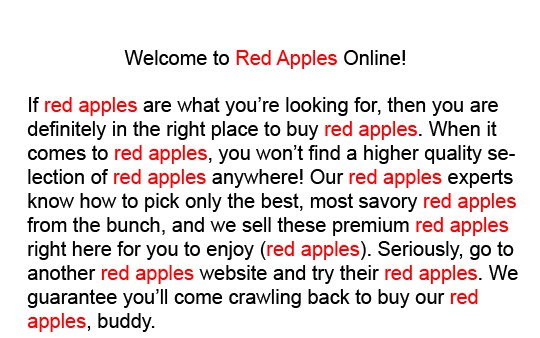
Don’t know about you but my eyes hurt.
Don’t overthink this one. Just be sure to consider proper context when you use your keywords and you should be good to go.
7. You Have Too Many Low-Value Links
Links these days are more about quality than quantity. Spammers ruined this for us too.
Instead of linking to 5 non-sense sites, link to one really good one.
This is the circle of internet life. This is how high-quality sites encourage each other to make interesting and unique pages and content.
So all you have to do, is make sure you’re doing your due-diligence when you create links.
The easiest way to do this is to use a tool like Ahrefs to pull a backlink report from your own site. Pay attention here, backlink reports are a critical part of any SEO analysis.

Next click “Links” on the left hand menu.
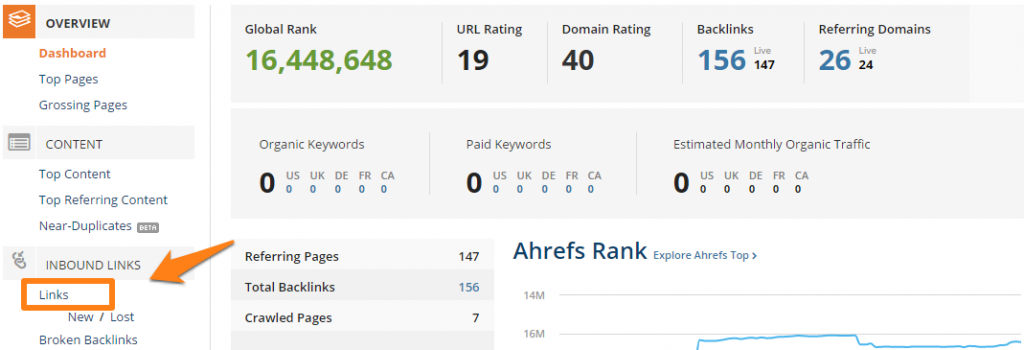
Finally, sort by Domain Authority. This is a simple and straightforward approach that should get the job done for most. Remember, very low domain authority links are generally not worth having.
Ignore this SEO mistake at your own risk. Instead, curate worthwhile links and your rankings will do the talking.
8. Assuming Your Keyword Strategy is Correct
I had a few friends growing up that loved to say “don’t assume, it makes an ass out of both you and me.”
I always thought that was a really annoying thing to say. Especially since assuming is a fundamental part of being human. We make assumptions all day, and this ability to predict and recognize patterns probably has a lot to do with our success as a species.
But I digress, when it comes to marketing and SEO, you’ll find time and time again that our assumptions are often far from correct.
Keyword research falls under this umbrella. Just because you would search a term a certain way, doesn’t mean that the majority of people will.
You’ll find yourself surprised time and time again by the some of the ways people will choose to look for a particular service or product. So take a little extra time and do your homework.
We have a comprehensive guide to doing keyword research that you can check out to learn more.
9. Not Having an XML Sitemap
Newcomers to online business and website management however, may not be familiar with this. Luckily, sitemaps are quite simple to understand and the benefits are significant.
An XML sitemap will help Google know exactly what pages to index. Further, it helps to illuminate the relationships between various pages on your site. As you might imagine, your tertiary pages can really get some SERP love from this tactic.
If you’re not sure how to get this done, check out QuickSprout’s great video on how to set up a sitemap. It should cover everything you need to know.
10. Not Using Image Tags
When you upload images to your website, they are basically invisible to search robots. In order to make them visible and recognized as valuable and relevant content, you’ll have to give them appropriate and unique tags.
You may of course consider using keywords when creating ALT tags for your images, but don’t go overboard here. Only use them if they make sense.
For example, do not do the following:
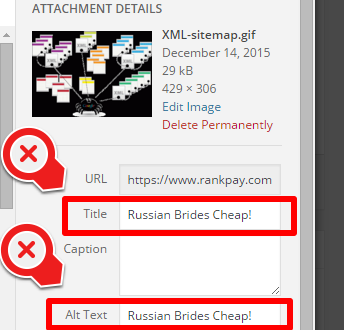
Are You Making Any of These SEO Mistakes?
Don’t panic. It’s never too late to get started fixing them up.
Hopefully with the above advice, you’ll be able to easily give your SEO campaign a serious boost.
So get after it, and good luck!








